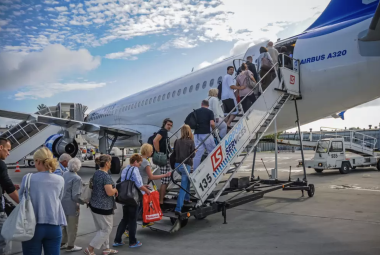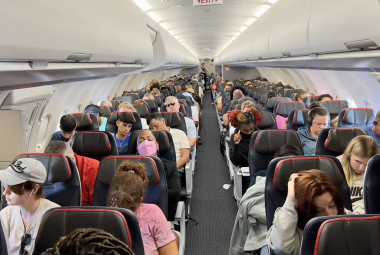Photo by Marina Hinic
*Vacation Mode is a for-profit site. It contains paid banner advertisements that are generated and managed by a third-party network. This site also includes relevant affiliate links (both in the content and on the sidebar) all of which we do our best to clearly mark as such.
Are you aware of your rights when your flight is delayed or canceled? Understanding your entitlements for delayed flights is crucial for ensuring you receive the compensation you deserve.
In this comprehensive article, we will explore the compensation policies of major US airlines, as well as the various options available for compensation and insurance. Whether you are faced with a domestic or international flight delay, we will provide you with valuable insights on how to file a complaint, deal with denied boarding, lost luggage, and much more. So, let's dive in and ensure you are well-equipped to navigate the complexities of flight delays and cancellations.
Key Takeaways:
- Know your rights: You may be entitled to compensation for a delayed flight, depending on the airline, destination, and circumstances.
- File a complaint: If your flight is delayed, you can file a complaint and potentially receive compensation.
- Protect yourself: Consider purchasing travel insurance or using a credit card with flight delay benefits to protect yourself against potential flight delays and cancellations.
Flight Delay Compensation: Your Rights and Options
When facing flight delays or cancellations, passengers have the right to compensation and assistance, as outlined by the U.S. Department of Transportation and European Union regulations.
According to these regulations, if a flight is delayed for more than a certain period or canceled, airlines are required to provide passengers with a range of support, including meals, refreshments, and accommodation if necessary.
Passengers may be entitled to compensation depending on the circumstances, such as the length of the delay and the distance of the flight. It's important for passengers to be aware of their rights and to communicate with the airline to ensure they receive the appropriate assistance and compensation.
What are your rights if your flight is delayed?
Video by ABC7 News Bay Area
Understanding Your Entitlements for Delayed Flights
Understanding the entitlements for delayed flights is crucial for passengers, considering the compensations and accommodations provided under airline policies and regulations.
Exploring Major US Airlines' Compensation Policies
Exploring the compensation policies of major U.S. airlines provides insights into the refund and cancellation procedures, aligning with the guidelines established by the Department of Transportation.
Compensation and Insurance Options for Delayed or Canceled Flights
Passengers have various compensation and insurance options to consider in cases of delayed or canceled flights, including travel insurance coverage and credit card benefits, in addition to the compensations mandated by the U.S. Department of Transportation.
Credit Cards Offering Compensation or Insurance
Certain credit cards provide compensation and insurance coverage for flight delays, cancellations, and related travel inconveniences, offering valuable benefits to cardholders facing such situations.
These benefits may include reimbursement for meals, accommodation, and transportation expenses incurred due to flight delays or cancellations. Some credit cards offer coverage for lost or delayed baggage, as well as emergency medical expenses during travel.
Travel insurance provided by select credit cards also extends to trip interruption or cancellation, offering reimbursement for non-refundable expenses such as hotel bookings or tour reservations.
These credit card benefits often come with 24/7 assistance services to help cardholders navigate unexpected travel disruptions, providing peace of mind and support during challenging situations.
U.S. Domestic and International Flight Scenarios
In both domestic and international flight scenarios, passengers are entitled to compensation and assistance based on the airline policies and regulations established by the U.S. Department of Transportation.
For domestic flights, passengers are typically entitled to compensation for denied boarding due to overbooking, baggage delays, or cancellation, provided that they have checked in on time. The compensation amount is determined by the length of the delay and the cost of the ticket. Airlines are required to inform passengers about their rights regarding compensation.
In terms of international flights, the Montreal Convention sets the guidelines for compensation in the event of baggage damage, loss, or delay. Passengers are entitled to claim compensation for these issues, and the amount may vary depending on the circumstances.
EU Departing or Domestic Flight Scenarios
For flights departing from or within the European Union, passengers have specific entitlements for compensation and assistance in cases of delays or cancellations, in accordance with EU regulations.
These entitlements are outlined in Regulation (EC) No 261/2004, which establishes rules regarding compensation and assistance to passengers in the event of denied boarding, flight cancellations, or long delays.
Passengers may be entitled to compensation ranging from €250 to €600, depending on the distance of the flight and the length of the delay.
Airlines are required to provide meals, refreshments, and accommodation if necessary, as well as communication facilities.
It is important for passengers to be aware of their rights in such situations and to understand the criteria for receiving compensation.
Middle East, Africa, or Asia Flight Scenarios
In flight scenarios involving the Middle East, Africa, or Asia, passengers can explore compensation options and travel insurance coverage to address delays and cancellations, complementing the protections offered by the U.S. Department of Transportation.
With compensation options, passengers may receive financial reimbursement for inconveniences caused by flight delays or cancellations. This can be particularly valuable in regions where travel schedules can be more unpredictable.
Travel insurance coverage can offer a safety net for travelers, providing assistance with accommodations, meals, and alternative transportation arrangements when faced with unforeseen disruptions to travel plans. This can alleviate the stress and financial burden that may arise from extended delays or sudden cancellations.
Considering the unique circumstances of the Middle East, Africa, and Asia, where varying cultural and environmental factors might come into play, having access to different compensation options and comprehensive travel insurance coverage becomes crucial for ensuring a smoother travel experience.
Steps to File a Complaint for Flight Delays
Passengers facing flight delays can follow specific steps to file a complaint and seek compensation through airline customer service or the relevant departments, in alignment with the procedures outlined by the U.S. Department of Transportation.
In many cases, the initial step is to address the issue directly with the airline's customer service. This may involve providing details of the situation, such as flight number, departure and arrival times, and any inconveniences caused.
If the resolution provided by the airline is not satisfactory or if the passenger wishes to seek further action, they may contact the relevant department within the airline. It's important to keep records of all communications and documentation, including emails, letters, and any compensation offered.
For unresolved complaints or disputes, passengers can turn to the U.S. Department of Transportation (DOT), which has specific guidelines and procedures for addressing such issues. This may involve submitting a formal complaint through the DOT's website or addressing it via mail, providing all necessary details and documentation to support the claim for compensation.
Insights on Denied Boarding and Overbooking
Understanding the implications of denied boarding and overbooking situations involves recognizing passengers' rights, managing boarding pass issues, and seeking assistance from airline customer service or relevant authorities, as per the guidelines established by the U.S. Department of Transportation.
When a passenger is denied boarding or faced with an overbooking situation, it can lead to a disruptive and at times distressing experience. Airlines are obliged to compensate passengers in such instances. How they handle such cases and the level of compensation can vary.
It's crucial for passengers to understand their rights, including compensation entitlements, meal vouchers, or even accommodation, depending on the circumstances. Managing boarding passes is an essential consideration. Any discrepancies or issues on the boarding pass could lead to potential complications during the check-in process and when boarding the aircraft. Ensuring that the information on the boarding pass is accurate and matches the traveler's identification is crucial to avoid any last-minute inconveniences or denials.
Dealing with Delayed, Lost, or Damaged Luggage
Dealing with delayed, lost, or damaged luggage necessitates prompt action and communication with airline customer service, aligning with the established procedures and regulations for baggage claims set forth by the U.S. Department of Transportation.
If you discover a delayed, lost, or damaged bag, it's important to act quickly. Contact the airline's customer service or visit the baggage claim office at the airport. Be sure to provide a detailed description of the bag and its contents, along with any relevant documentation such as the baggage claim ticket and travel itinerary.
Following DOT regulations is crucial in these situations to ensure you receive compensation for any inconvenience caused. Airlines are required to compensate passengers for reasonable expenses resulting from delayed or lost luggage, within certain limits set by the DOT.
What to Do if You Miss a Connecting Flight due to Delays
In case of missing a connecting flight due to delays, passengers can take specific measures to address the situation and seek compensation, following the guidelines and provisions outlined by the U.S. Department of Transportation.
Once a passenger realizes they have missed their connecting flight, it's essential to immediately inform the airline staff. They should seek assistance in rebooking on the next available flight and ask about any compensation or amenities that may be provided as per the DOT guidelines.
Passengers should document the situation, including the cause of the delay, and any communications with airline representatives. This information can be valuable when claiming compensation.
It's advisable for passengers to familiarize themselves with the passenger rights and obligations under DOT regulations, which outline the responsibilities of airlines for situations like missed connections due to delays. By knowing their rights, passengers can advocate for fair treatment and seek appropriate compensation.
Understanding the Different Types of Compensation for Delayed Flights
Understanding the various types of compensation available for delayed flights involves recognizing the provisions and guidelines established by the U.S. Department of Transportation and the respective airline policies, aimed at addressing passengers' inconveniences and disruptions.
When a flight is delayed, passengers may be entitled to compensation or benefits, depending on the length of the delay and the specific circumstances.
The Department of Transportation sets certain standards and requirements for airlines to follow in providing compensation for delayed flights. These standards are designed to protect the rights of passengers and ensure that they are adequately compensated for the inconvenience caused by the delays.
Many airlines have their own policies and guidelines in place to address delayed flights and provide appropriate compensation to affected passengers. It is important for passengers to be aware of these policies and provisions in order to understand their rights and potential entitlements when facing flight delays.
Guidance on Finding the Reason for Your Flight Delay or Cancellation
Seeking guidance on identifying the reasons for flight delays or cancellations entails understanding the role of DOT rules, effective communication with airline customer service, and considering external factors such as weather conditions that may impact flight operations.
When examining the causes of flight delays or cancellations, it is essential to comprehend the regulations set forth by the Department of Transportation (DOT) that govern airline operations. It is particularly crucial to be aware of the specific protocols and obligations outlined by the DOT which influence how airlines manage and communicate disruptions in their services.
Effective interaction with airline customer service representatives can often provide valuable insights into the underlying reasons for flight delays or cancellations. Engaging with these professionals in a respectful and proactive manner can yield crucial information about any internal issues or operational challenges affecting scheduled flights.
Considering external factors, such as weather conditions, plays a significant role in comprehending the dynamics of flight delays or cancellations. Weather-related disruptions are a frequent occurrence within the aviation industry and understanding how adverse conditions can impact flight operations is pivotal in discerning the reasons behind these interruptions. For more information on what are your rights when your flight is delayed, you can refer to this reputed source.
How to Protect Yourself from Flight Delays and Cancellations
Protecting yourself from flight delays and cancellations involves strategic approaches such as reviewing flight schedules, prioritizing airlines with strong on-time performance, and considering factors like ticket purchases and airport operations to mitigate travel disruptions.
Before booking your tickets, it's essential to scrutinize the airline's track record for punctuality and reliability. Choosing flights during non-peak hours and less weather-sensitive periods, like early mornings or midday, may lower the risk of delays.
When purchasing tickets, opting for refundable or flexible fare options can provide more leeway in case of unforeseen changes. Staying informed about the airport's operations and any potential air traffic issues can help in proactively addressing any concerns that may affect your journey.
Recap: Your Rights and Options for Flight Delay Compensation
In recap, passengers possess specific rights and options for flight delay compensation, guided by the policies of major carriers and the provisions established by the U.S. Department of Transportation, ensuring a comprehensive understanding of the available entitlements and assistance.
When a flight gets delayed, passengers have the right to be informed about the reason for the delay and the anticipated departure time. The U.S. Department of Transportation mandates that airlines must provide passengers with the option to disembark an aircraft if it is delayed on the tarmac for an extended period.
Depending on the duration of the delay and the airline's policy, passengers may be entitled to meals, accommodations, or even monetary compensation. It is essential for passengers to familiarize themselves with the specific policies of the airlines they are flying with, as each carrier may have distinct procedures and provisions for handling flight delays.
Maximizing Rewards and Benefits
Maximizing rewards and benefits in the context of flight delay compensation involves leveraging travel insurance, credit card perks, and the specific policies of major carriers, while aligning with the regulations stipulated by the U.S. Department of Transportation.
In terms of flight delay compensation, travelers can strategically use travel insurance to safeguard their financial interests in the event of unexpected delays. Comprehensive travel insurance plans often include coverage for trip interruptions, which can encompass flight delays, providing reimbursement for incurred expenses such as accommodations, meals, and transportation.
Likewise, individuals can benefit from credit card perks that may offer trip delay reimbursement as part of their cardholder benefits. This feature, typically associated with premium credit cards, provides compensation for certain expenses, such as lodging and meals, if the delay exceeds a specified time duration.
Understanding the specific policies of major carriers is crucial for claiming compensation. Many airlines have established guidelines for compensation in the event of flight delays, including reimbursement for expenses or alternative travel arrangements. Familiarizing oneself with these policies can help travelers make informed decisions and assert their rights in such situations.
Insights on Travel Insurance and Its Worth
Gaining insights into the value and significance of travel insurance involves assessing its role in providing compensations and coverage for flight delays, in conjunction with potential benefits offered by credit cards and the protection guaranteed by the U.S. Department of Transportation.
Travel insurance is designed to mitigate the financial risks associated with unforeseen events during travel, such as trip cancellations, medical emergencies, or lost baggage.
A crucial aspect is the compensatory potential for flight delays, where policyholders can claim reimbursements for additional expenses incurred. Many credit cards provide travel insurance as a complimentary benefit, extending similar protections for flight delays and other travel inconveniences.
U.S. Department of Transportation regulations also mandate compensation for lengthy flight delays, emphasizing the importance of knowing these rights as a traveler.
Best Travel Insurance Companies in [Current Year]
Identifying the best travel insurance companies in the current year involves evaluating their offerings for compensations, coverage related to flight delays, and potential synergies with credit card benefits and the regulatory safeguards of the U.S. Department of Transportation.
When seeking out top travel insurance providers, it's crucial to consider compensations that they offer in various scenarios such as trip cancellations, interruptions, or medical emergencies during travel. Several leading companies provide robust coverage for these instances, which can provide much-needed financial protection and peace of mind for travelers.
In addition, their provisions for flight delay coverage, including reimbursements for meals, accommodations, and other essential expenses, play a pivotal role in ensuring a smooth and secure travel experience.
Aligning with credit card benefits is a significant aspect to consider. Many travelers may already have some level of travel insurance through their credit cards, so understanding the intersection between their existing coverage and the offerings of the selected providers is essential.
Delving into the regulatory protections provided by the U.S. Department of Transportation can assure travelers of the companies' compliance with industry standards and regulations, further enhancing the credibility of their coverage and services.
Frequently Asked Questions
What are my rights when my flight is delayed?
According to the US Department of Transportation, if your flight is delayed for more than 3 hours, you are entitled to compensation from the airline.
What kind of compensation can I receive for a delayed flight?
The type of compensation you can receive for a delayed flight varies, but it can include a refund for the cost of your ticket, a voucher for future travel, or reimbursement for any additional expenses incurred due to the delay.
Do my rights change depending on the reason for the delay?
No, your rights are the same regardless of the reason for the delay. Whether it is due to weather, mechanical issues, or airline overbooking, you are still entitled to compensation.
How do I know if I am eligible for compensation?
If your flight is delayed for more than 3 hours, and you arrived at your final destination more than 3 hours after your scheduled arrival time, you are eligible for compensation.
What should I do if I am not offered compensation by the airline?
If you believe you are entitled to compensation for a delayed flight and the airline does not offer it, you can file a complaint with the US Department of Transportation.
Are there any exceptions to receiving compensation for a delayed flight?
There are some exceptions to receiving compensation for a delayed flight, such as if the delay was due to extreme weather conditions or air traffic control issues. However, these exceptions are rare and you may still be entitled to compensation in certain circumstances.
More Flight Rights
What are my rights when my flight is delayedWhat are my rights when my flight is cancelled
What are my rights if my flight is rescheduled
What are my rights if my connecting flight is cancelled


















